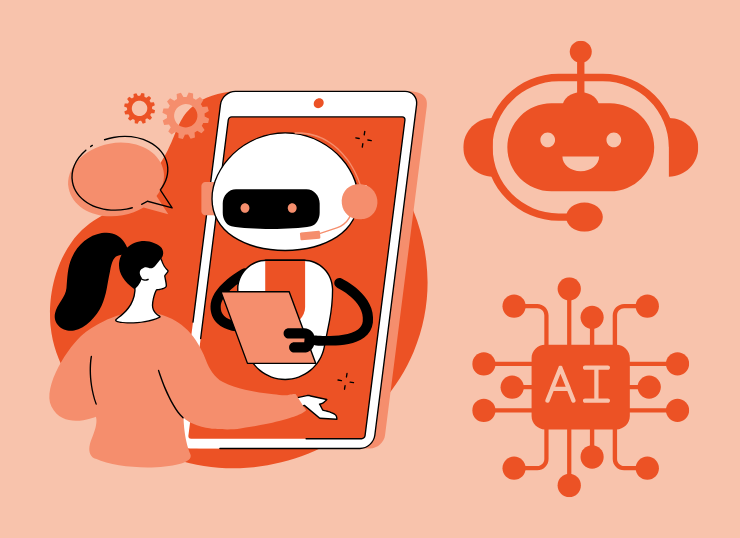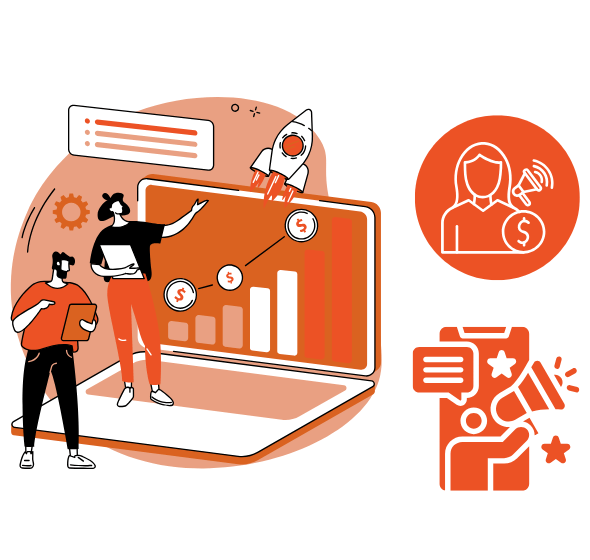AI Chatbots vs. Traditional Bots: Who Truly Delivers?
Introduction
The way businesses communicate with customers has undergone a massive transformation over the last decade. What started with simple scripted bots has now evolved into highly intelligent AI chatbots capable of handling complex queries, maintaining conversational context, and even predicting user needs. This shift has changed how organizations view automation, customer service, and scalability.
While traditional bots are still widely used for their simplicity and cost-effectiveness, AI-powered chatbots have emerged as game changers, thanks to advancements in Natural Language Processing (NLP), Machine Learning (ML), Deep Learning, and Generative AI. The challenge for most businesses today is deciding whether they should continue with traditional rule-based bots or transition toward intelligent AI solutions.

Ready to Boost Your Online Visibility? Partner with Our Premier Digital Marketing Firm!
Boost your online business with Gandhi Technoweb Solutions’ stellar digital marketing team! Discover unparalleled digital marketing strategies designed to align perfectly with your budget.
In this blog, we’ll take a detailed look at how traditional bots and AI chatbots differ, their strengths, weaknesses, and future relevance, and most importantly, which one truly delivers better results in real-world applications.
What are Traditional Bots?
Traditional bots, also known as rule-based chatbots, are designed around structured scripts. They rely on a fixed set of pre-programmed rules that determine how they respond to user input. Think of them as interactive FAQs – useful when the questions are predictable, but limited when users deviate from the script.
How Traditional Bots Operate?
- Built on decision tree logic, where each question branches to a predefined response.
- Depend heavily on keyword matching. If the user’s query matches the stored phrase, the bot provides the correct answer.
- Limited to single-turn conversations. Once the context is lost, they cannot recall previous exchanges.
- Cannot adapt or learn. They remain as they were originally programmed.
Strengths of Traditional Bots
- Easy to build and deploy, even with limited technical resources.
- Cost-effective for businesses with small-scale operations.
- Reliable for repetitive tasks such as booking appointments or providing store hours.
- No need for large datasets or training models.
Limitations of Traditional Bots
- Lack of flexibility when queries are phrased differently.
- Fail to handle complex, multi-intent queries.
- Cannot analyze user intent or emotion.
- Often frustrate customers when they get stuck in loops or deliver irrelevant answers.
Traditional bots are best suited for basic, repetitive, and predictable interactions, but their rigidity makes them less effective in today’s fast-evolving digital landscape.
What are AI Chatbots?
AI chatbots are intelligent conversational systems that simulate human-like interactions using advanced technologies such as NLP, ML, Deep Learning, and Generative AI. Unlike rule-based bots, they are not restricted to rigid workflows. Instead, they analyze language patterns, learn from historical conversations, and continuously improve their responses.
How AI Chatbots Work?
- NLP allows the bot to understand not just the words but also the intent and context behind a user’s query.
- ML algorithms process large volumes of conversational data to improve accuracy and relevance over time.
- Deep Learning models enable advanced pattern recognition, helping bots interpret complex, multi-layered queries.
- Generative AI makes it possible to create dynamic, context-aware responses that feel natural.
- Multi-turn dialogue management helps bots carry context across several exchanges, making conversations flow seamlessly.
Advantages of AI Chatbots
- Ability to understand natural, human-like queries with high accuracy.
- Personalization through real-time data integration, such as CRM systems.
- Continuous improvement as more interactions are processed.
- Handles complex, multi-intent queries with ease.
- Provides consistent, scalable support for businesses across industries.
Challenges of AI Chatbots
- Require significant investment in training datasets, cloud infrastructure, and development.
- Implementation can be time-consuming.
- Dependence on data security and compliance frameworks to handle sensitive information.
Despite these challenges, the benefits of AI-driven chatbots far outweigh the limitations, especially for businesses looking to scale customer engagement globally.
Functional Differences Between AI Chatbots and Traditional Bots
At their core, the difference lies in adaptability. Traditional bots operate like static systems – useful only when questions match their scripts. On the other hand, AI chatbots learn, adapt, and provide intelligent, context-rich conversations.
Traditional bots are rule-followers, whereas AI chatbots are problem-solvers. This ability to evolve makes them more aligned with modern customer expectations.
Use Cases of Traditional Bots
Although they may seem outdated, traditional bots still have practical applications where simplicity and cost are priorities:
- Automated responses to FAQs on websites.
- Basic appointment booking systems in healthcare or salons.
- Standard order-tracking support in e-commerce.
- Ticket creation in IT helpdesk systems.
These bots thrive in low-complexity environments with repetitive and structured workflows.
Use Cases of AI Chatbots
AI chatbots have far broader applications, thanks to their ability to understand language and context. Real-world examples include:
- AI-powered customer support capable of resolving both simple and complex issues.
- Conversational commerce, where bots recommend products, upsell, and even close sales.
- Voice-enabled assistants integrated with IoT devices for smart homes and workplaces.
- Healthcare bots capable of analyzing symptoms and providing guidance before patients meet doctors.
- Fintech chatbots offering personalized investment recommendations and fraud detection support.
Their versatility makes AI chatbots ideal for industries that require scalability, personalization, and advanced problem-solving.
The Future of Conversational AI
The future of chatbots lies firmly in AI technologies. With advances in Generative AI, chatbots are becoming capable of producing highly personalized, contextually relevant conversations that rival human interactions. The integration of NLP with real-time data analytics ensures that these bots are not just reactive but proactive, anticipating user needs and delivering solutions before questions are asked.
Additionally, as businesses adopt omnichannel strategies, AI chatbots will seamlessly integrate across platforms – from websites and apps to social media and voice assistants. This cross-channel consistency will further enhance user satisfaction and trust.
The future may also see chatbots combining AI-driven predictive analytics with customer histories, enabling hyper-personalization on a scale previously unimaginable.

Elevate Your Local Presence: Partner with the Leading SEO Agency for Unmatched Visibility!
Stand out in local searches and outshine your competitors with our proven local SEO techniques, designed to put your business on the map.
Conclusion
Both traditional bots and AI chatbots have their place in the digital landscape. Traditional bots remain relevant for small-scale, repetitive tasks, where cost efficiency is more important than sophistication. However, for businesses aiming to deliver exceptional customer experiences, reduce operational costs, and scale globally, AI-powered chatbots clearly lead the way.
They are adaptive, intelligent, and capable of continuous improvement, making them indispensable in modern customer engagement strategies. In the debate of AI chatbots vs. traditional bots, the evidence strongly suggests that AI delivers more sustainable value, agility, and growth potential for businesses of all sizes.
Free SEO Audit Offer
Want to strengthen your digital presence and attract more customers online? Gandhi Technoweb Solutions is offering a Free SEO Audit to help you uncover hidden opportunities, analyze your website performance, and create a roadmap for higher search engine rankings. Get in touch today to claim your free audit and take the first step toward measurable growth.









